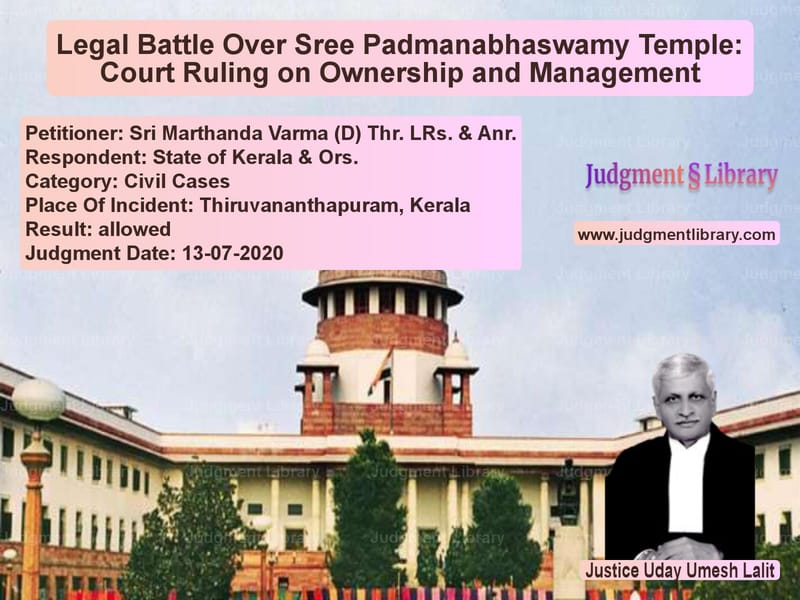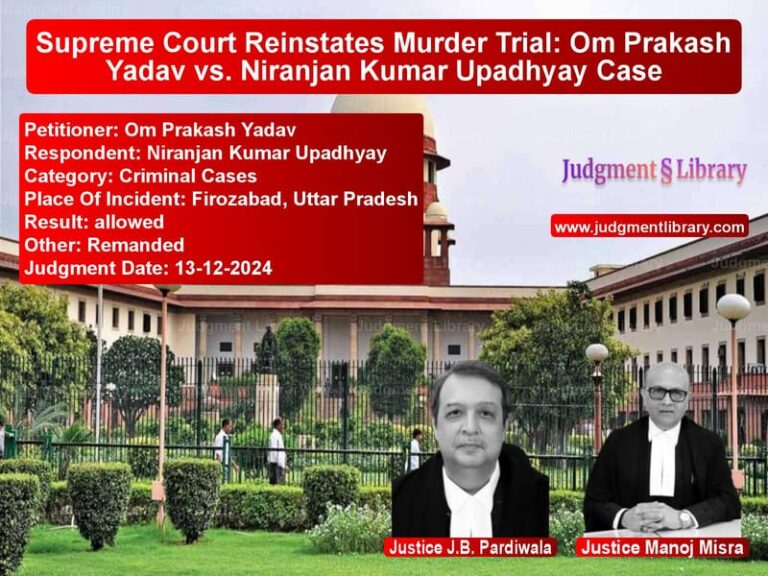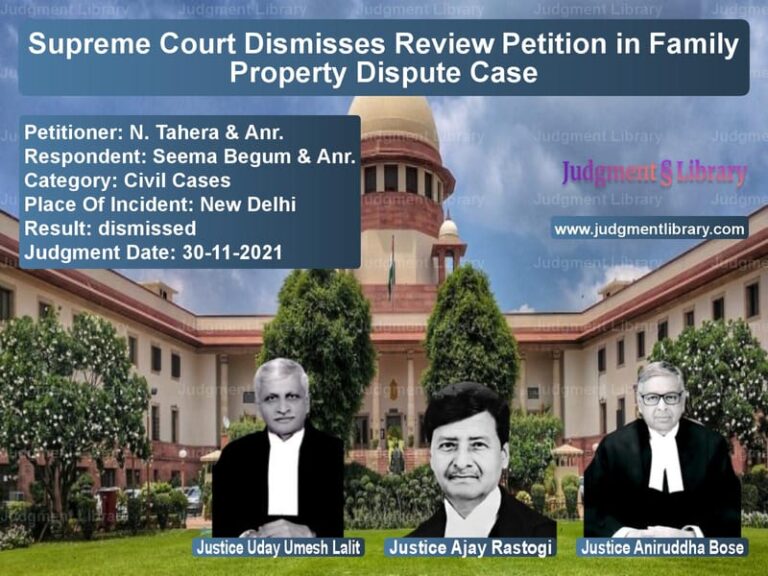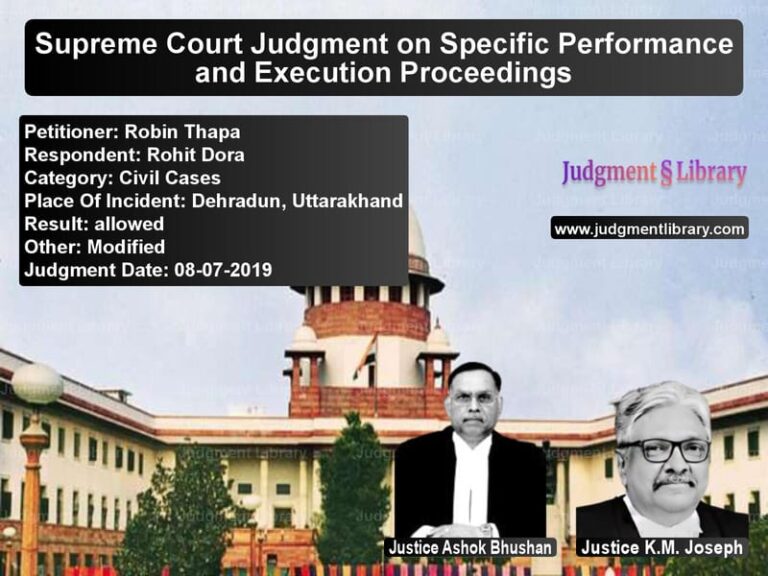Legal Battle Over Sree Padmanabhaswamy Temple: Court Ruling on Ownership and Management
The case of Sri Marthanda Varma (D) Thr. LRs. & Anr. vs. State of Kerala & Ors. revolved around the ownership, administration, and control of the famous Sree Padmanabhaswamy Temple in Kerala. The appellants, representing the Travancore Royal Family, challenged a Kerala High Court ruling that directed the state government to take over the administration of the temple. The Supreme Court of India adjudicated on various aspects of law, history, and religious rights before delivering its verdict.
Historically, the Travancore Royal Family has been managing the temple as trustees, following the belief that the Maharaja was a “Padmanabhadasa” (servant of Lord Padmanabha). The case’s origins trace back to a petition challenging the executive officer’s authority to manage the temple and demands for the state to take control, similar to other temples governed by the Travancore Devaswom Board.
Petitioner’s Arguments
- The appellants contended that the temple and its vast treasures belonged solely to the deity, Lord Padmanabha, and that the Royal Family had the right to continue its management as trustees.
- They argued that the High Court misinterpreted the constitutional amendments that abolished royal privileges, stating that such changes did not affect the temple administration.
- They emphasized that the temple was never a personal property but a religious institution protected under the Travancore-Cochin Hindu Religious Institutions Act, 1950.
- It was further argued that the state had no right to intervene in religious affairs that were being lawfully managed under an age-old tradition.
Respondent’s Arguments
- The State of Kerala argued that the concept of a “Ruler” ceased to exist after the Constitution (Twenty-Sixth Amendment) Act, 1971, and that the Royal Family no longer had a valid claim to manage the temple.
- It was contended that the temple and its treasures, being of immense public and historical significance, should be managed under government oversight to ensure transparency and security.
- The respondents pointed to cases of financial mismanagement and lack of public accountability in temple administration.
- They also highlighted the need for proper inventory and security arrangements for the treasures found in the temple vaults.
Court’s Analysis and Judgment
The Supreme Court took a detailed approach in analyzing the historical, legal, and religious aspects of the case.
Key Observations by the Court
- The court acknowledged the historical role of the Royal Family in temple administration but noted that such privilege was not absolute.
- The judges pointed out that the temple was not private property but a public religious institution that belonged to the deity.
- Regarding the constitutional amendments, the court clarified that while royal titles and privileges were abolished, the trusteeship of a religious institution was a separate matter.
- The court emphasized the need for transparency and accountability in temple management while upholding religious traditions.
Final Judgment
After considering all aspects, the Supreme Court ruled that the management of Sree Padmanabhaswamy Temple should remain with the Travancore Royal Family but under strict oversight. The key directives included:
- The temple’s administration should be conducted through a committee led by a retired judge, with members including government representatives and religious scholars.
- A complete inventory of the temple’s assets should be undertaken with modern security measures in place.
- The financial transactions of the temple should be audited regularly to ensure accountability.
- The temple should continue to function as per religious traditions, with the Royal Family playing a trustee role without personal claims over temple wealth.
Conclusion
The ruling provided a balanced approach by allowing the Royal Family to continue as trustees while ensuring public interest, security, and financial transparency. The decision reinforced the principle that temples belong to the deities and the devotees, not to individuals or governments. This case sets a precedent in matters involving temple administration and religious rights.
Petitioner Name: Sri Marthanda Varma (D) Thr. LRs. & Anr..Respondent Name: State of Kerala & Ors..Judgment By: Justice Uday Umesh Lalit.Place Of Incident: Thiruvananthapuram, Kerala.Judgment Date: 13-07-2020.
Don’t miss out on the full details! Download the complete judgment in PDF format below and gain valuable insights instantly!
Download Judgment: Sri Marthanda Varma vs State of Kerala & Or Supreme Court of India Judgment Dated 13-07-2020.pdf
Direct Downlaod Judgment: Direct downlaod this Judgment
See all petitions in Property Disputes
See all petitions in Succession and Wills
See all petitions in Landlord-Tenant Disputes
See all petitions in Judgment by Uday Umesh Lalit
See all petitions in allowed
See all petitions in supreme court of India judgments July 2020
See all petitions in 2020 judgments
See all posts in Civil Cases Category
See all allowed petitions in Civil Cases Category
See all Dismissed petitions in Civil Cases Category
See all partially allowed petitions in Civil Cases Category







